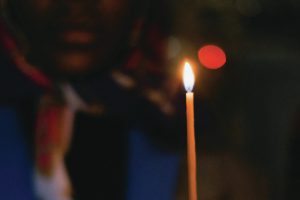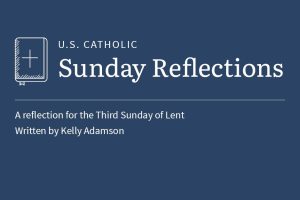“As human beings we are capable of participation in the very humanity of other people, and because of this every human being can become our neighbor,” poignantly wrote Karol Wojtyła , long before he became St. Pope John Paul II. People do not exist in isolation; we are formed in and for community. For this reason, participation in the common good, alongside human dignity, are hallmarks of Catholic social teaching.
Today, however, we find ourselves in communities fractured by deep divisions—political, ecclesial, and social. Our ability to be in community at all seems precarious. Between technology and living costs, it can feel as if forces are conspiring against building meaningful relationships.
In 2023, the U.S. Surgeon General Vivek Murthy released a public health report, “Our Epidemic of Loneliness and Isolation,” in which he noted that “about one-in-two adults in America reported experiencing loneliness” before the advent of the COVID-19 pandemic. Feelings of loneliness and isolation are at particularly high rates among Millennials and Gen Z. In “What’s behind America’s Loneliness Crisis,” Ian Marcus Corbin argues that economic pressures at both work and home fostered a system in which “we are all mercenaries scrambling to grab some scrap of security for ourselves and those we love.”
Within this social structure, the young and the old are even more vulnerable to loneliness. Drawing our attention to loneliness among the elderly, Pope Francis chose “do not cast me off in my old age” from Psalm 71 as the theme for this year’s World Day for Grandparents and the Elderly. And while technology can sometimes provide important means of connection, social media negatively impact feelings of belonging, increasing isolation and anxiety among adolescents and children.
Political or ideological division is not merely a fragmentation but becomes also a form of isolation. Due to increasing loneliness, there is risk of forgetting how to belong to community itself. We are losing our ability to engage in shared agency. As Pope Paul VI reminded us in Gaudium et Spes (On the Church in the Modern World), “This social order requires constant improvement . . . founded on truth, built on justice, and animated by love.”
In this climate of division, how can we work together for the common good? As a social ethicist, I often argue for voting as a crucial component. But voting is only a piece of the puzzle. True civic participation begins in our daily lives, in the small, local actions that build community from the ground up.
This summer, a massive grassroots campaign began to restore the full funding of the New York City Public Libraries in the face of proposed cuts. Community organizing showed how diverse groups could come together out of a shared sense of belonging. A shared agency that emerged from the social capital and belonging fostered by the public library, a space for diverse groups such as children’s or seniors’ book clubs, as well as a free and safe place to refuge from the summer heat. A shared commitment to justice and love of neighbor was evident in this widespread public response. Isolation is real, but examples of participation offer reasons for hope.
Decades ago, sociologist Robert Putnam rang alarm bells about isolation and loneliness in his landmark book Bowling Alone (Simon & Schuster), focusing on the disappearance of recreational communities such as bowling leagues. The social capital created by communal recreation activities combats social isolation and opens new possibilities to build community.
Amid the loneliness crisis, there are pockets of hope and connection. New forms of community are emerging in unexpected places. Established community centers like the YMCA provide affordable and inclusive avenues for community building. The popularity of fitness programs like Orangetheory or CrossFit provides spaces where adults can build community akin to Putnam’s bowling leagues. While these recreational activities may seem trivial, they lay the groundwork for deeper, more meaningful community engagement.
If we want to combat loneliness and isolation, we must also ask what our parishes can do to allow for greater social participation. How can we attend to the loneliness and isolation that affect us and our neighbors? As we consider both the ongoing synod and the U.S. presidential election, we must build community first and from there work together to build the common good.
This article also appears in the October 2024 issue of U.S. Catholic (Vol. 89, No. 10, pages 40-41). Click here to subscribe to the magazine.
Image: Unsplash/Ismail Hamzah















Add comment